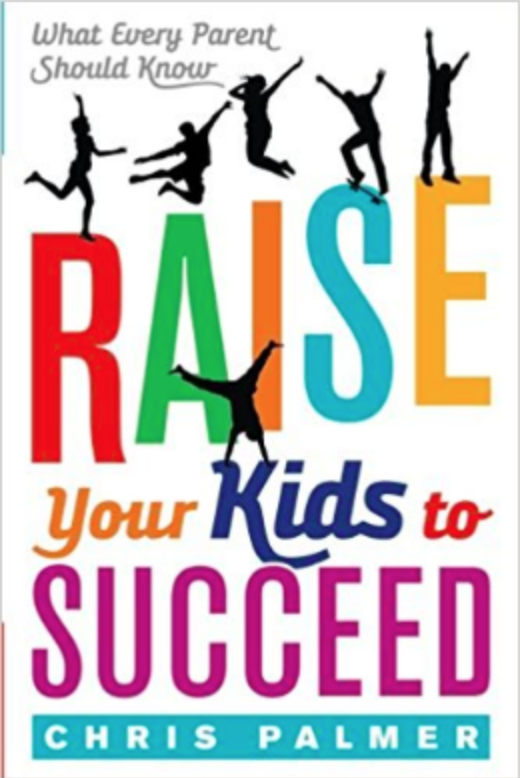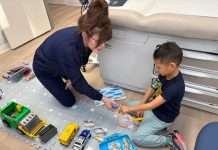We are part of Amazon Affiliates
For this month’s book club post we have a special guest: the author of this month’s book, Chris Palmer!
(Note: he’s also my Dad!)
 He wrote the recently published book, Raise Your Kids to Succeed. He’s a father (to me and my two sisters), writer, speaker, professor, and environmental filmmaker. His book is informative and has a lot of practical tips for day to day parenting.
He wrote the recently published book, Raise Your Kids to Succeed. He’s a father (to me and my two sisters), writer, speaker, professor, and environmental filmmaker. His book is informative and has a lot of practical tips for day to day parenting.
 We hope you enjoy this Q&A with the author!
We hope you enjoy this Q&A with the author!
—
What inspired you to write this book?
When I was starting out as a young father, I looked for parenting books that would help me be a better dad, but I couldn’t find many. I’ve written the book I wish I could have found 45 years ago: a short book packed with practical, effective advice.
What are the top 3 lessons you hope every new mom remembers from this book?
Be a role model. Children should see parents who are physically, mentally, and emotionally healthy so that they have a positive example to emulate. Moreover, daughters who spend time with a loving and capable father, and sons who spend time with a loving and capable mother, learn how to treat and be treated by the opposite gender. Every mother and father should manifest what it is to be a responsible and trustworthy person by being kind, courteous, respectful, and honest.
Be a teacher and coach. Skilled parents teach their kids to know right from wrong, to make good choices and to grasp basic life lessons, such as how to be resilient and rebound from setbacks and disappointments. They look for teaching moments to help their children become independent and self-reliant.
Teach values and principles. Identify your own core values and timeless principles and live by them. Know what matters deeply to you and share those ideals with your family while modeling them in your daily life and actions. Great parents pass on values and principles to their children, who navigate in a world sometimes bereft of them.
What do you think is the biggest mistake parents make?
A big one is to yell at and even hit their kids. That is the wrong thing to do. Another big mistake is to forget to catch their kids doing something right, but only catch them making mistakes and behaving badly. Another one is to unintentionally neglect their children by being absorbed by their iPhones or laptops.
Looking back, what big mistakes did you make parenting?
My biggest mistake was to be too grumpy, too curmudgeonly, too irritable, and too impatient. I realized after a few years what a terrible mistake I was making and how much damage I was doing to my family, so I changed my behavior, and everyone benefited. The essential secret is to listen more attentively. It’s hard to be rancorous and splenetic if you are actively listening to your child.
What advice do you have for creating boundaries with technology?
Recent evidence is revealing how deleterious and harmful excessive screen time can be to children’s physical, mental, and emotional health. The key is to have established house rules that everyone, including mom and dad, has to adhere to. For example, no iPhones during family dinners. No screens in bedrooms after 9 pm. No TVs in any bedrooms. Limit screen time, especially for younger kids.
What are some daily habits that you’d recommend parents adopt with their school-aged kids?
Spend time with your child. It is essential to spend quality time with your children and not neglect them. It can be challenging to have quality time without spending quantity time. If carving out time to be with your children means not playing golf on the weekend, so be it. Sacrificing nonessentials is a key way to show you are a committed parent. Spending time with your child shows you love and value them. You don’t want to grow old and regret having missed opportunities to do things together. Those opportunities, once gone, are gone forever. Give your child ample time to be with you so that she will be less likely to seek inappropriate attention from other adults or influences.
Don’t be afraid to let your children feel uncomfortable. Parents make a mistake when they rush in to save their children from every bit of discomfort. Let them struggle; in the struggle, they are learning. If you save your child every time, you are teaching her that she is helpless and weak. Whenever possible, let your child meet her own challenges, whether that means solving an algebra problem, writing a college essay, or resolving a disagreement with a friend. You want her to have courage and grit when faced with difficulties.
Make feeling grateful an important family goal. Help your children list in a simple notebook on a regular basis all the things for which they are grateful. This is a wonderful antidote to low moods and self-absorption. It will give your children a sharpened appreciation for how lucky they are, even when they run into a string of bad luck.
What do you remember as the hardest time of your parenting career?
Being a young dad and realizing that my daughters much preferred to be with my wife than with me. It hurt. I had to be creative to find ways to matter to them.
You love to write. How did you fit writing into fatherhood? How did you make time for it?
It’s hard to be both a successful and loving parent, and also be a successful and productive professional. What helped me was having a personal mission statement, being self-disciplined, working hard, using deft time management skills, being focused, and not wasting time on things that don’t matter, like vapid TV shows.
—
Thank you for such great advice! And for being such a great dad.
Join us for next month for No Bad Kids by Janet Lansbury, which we’ll review on March 26!
Get your books here!
[xyz-ihs snippet=”Raise-your-kids”] [xyz-ihs snippet=”No-Bad-Kids-book”]



















So much great advice here!